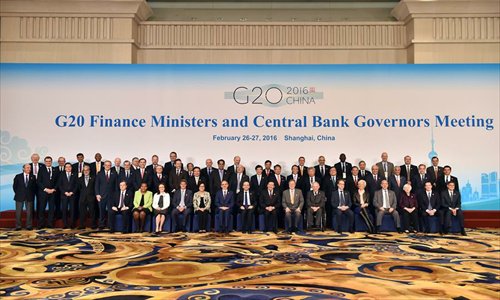HOME >> BUSINESS
G20 economies pledge "all policy tools" to strengthen global recovery
Source:Xinhua Published: 2016-2-28 9:59:05

Officials pose for a family photo at the G20 Finance Ministers and Central Bank Governors Meeting at the Pudong Shangri-la Hotel in Shanghai, east China, February 27, 2016. Chinese policymakers on Friday sketched out the country's economic policies and reform agenda, reassuring the world that the government has plenty policy tools to combat downward pressure as financial leaders from G20 nations gathered in Shanghai. Photo: Xinhua
Financial policymakers from the world's 20 major economies on Saturday pledged to use all policy tools, including monetary, fiscal and structural ones, to strengthen global recovery amid growing concerns of further downward risks.
"The global recovery continues, but it remains uneven and falls short of our ambition for strong, sustainable and balance growth," noted a communique issued after the two-day G20 Finance Ministers and Central Bank Governors Meeting in Shanghai.
The policymakers cited volatile capital flows, slumping commodity prices, escalated geopolitical tensions, a potential UK exit from the European Union and increasing refugees as major vulnerabilities of the global economy.
The gathering came amid weak economic growth worldwide and increasing financial volatility that saw frequent and drastic falls in the stock markets across the world.
Japan's surprising adoption of negative interest rates, uncertainties over the prospect of rate hikes in the United States, plunging oil prices and concerns over the financial strength of leading banks in Europe have combined to add uncertainties to the global financial landscape.
Despite the challenges, the group judges that the magnitude of recent market volatility has not reflected the underlying fundamentals of the global economy.
"We expect activity to continue to expand at a moderate pace in most advanced economies, and growth in key emerging market economies remains strong," the group said.
To foster confidence, monetary policies will continue to support economic activity and ensure price stability, but monetary tools alone cannot lead to balanced growth, said the communique.
"We will use fiscal policy flexibly to strengthen growth, job creation and confidence," it added.
Among the focus of the meeting is the exchange rate mechanism. For China, the currency yuan has been heading south since the government revamped the foreign exchange mechanism last year, and concerns about capital outflows have been on the rise.
Chinese central bank governor on Friday repeated that there is no basis for continued weakness of the yuan and China will not seek to boost exports through competitive devaluation.
The group reiterates that excess volatility and disorderly movements in exchange rates can have adverse implications for economic and financial stability.
"We reaffirm our previous exchange rate commitments, including that we will refrain from competitive devaluations and we will not target our exchange rates for competitive purposes," the communique said, pledging to carefully calibrate macroeconomic policies to reduce uncertainty, minimize negative spillovers and promote transparency.
During the meeting, the economies also promised to fully implement agreed financial reforms, combat terrorist financing and mobilize green finance.
The G20 Finance Ministers and Central Bank Governors Meeting came in advance of the G20 Hangzhou Summit, which is slated for Sept. 4 and 5 with a theme of "Towards an Innovative, Invigorated, Interconnected and Inclusive World Economy".
Posted in: Economy